Samuel L Jackson Soul Men Interview
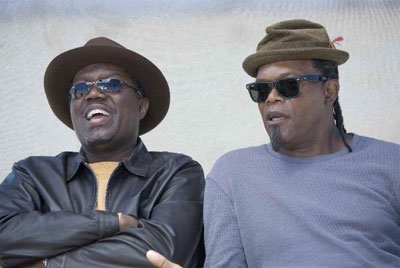
SAM JACKSON IS A SOUL MAN.
EXCLUSIVE Samuel L. Jackson, Soul Men Interview by Paul Fischer.Samuel L. Jackson is a veteran movie star, political activist and a hell of a nice guy. Always known on screen as somewhat intense, it's refreshing to see the iconic actor letting himself go in a comedy, a soulful comedy at that. The film tells of two estranged soul-singing legends (Jackson and the late Bernie Mac) who agree to participate in a reunion performance at the Apollo Theater to honour their recently deceased band leader. In this far ranging discussion with Paul Fischer Jackson talks comedy, movies and politics in this very exclusive chat.
QUESTION: I was very pleased that you're back and doing a comedy. It's been a while. The Man was the last comedy you did.
SAMUEL L. JACKSON: Uh-huh (AFFIRM). Yeah.
QUESTION: Why did it take you so long to - because you obviously have a great comedic sense, and a great sense of humor. And yet, you're this intense character on-screen.
SAMUEL L. JACKSON: Well, those are the scripts that come by me. I don't get that many scripts that are comedic scripts, number one. And a lot of them - you know, the ones that I get aren't that good. This one spoke to me in a different kind of way. And, you know, you have the right elements. You get Bernie. It's like doing The Man with Eugene, I thought was a great idea, because Eugene's a great comic actor. You know. It's just that sometimes all the elements around it ruin that idea. And it seems like people conspire not to make it happen. It's like I said before. The biggest concern about doing a comedy, for me - because the few that I've done now - is hearing people say, "We can make it funny." Because it's either funny or it's not. When I read it on the page, it was funny. You've got Bernie Mac, I guess it's gonna be funny. Now, I don't need some other guy telling me, "We can make this funnier by doing this." Because that's not funnier to me. What's on the page is funny, and what we have is funny. And we trust what's here. So let us do this, and shoot it, and I guarantee you it'll work.
QUESTION: Were you encouraged to improv at all? Do you want to?
SAMUEL L. JACKSON: We rehearsed before we started shooting. And for me, after you've rehearsed, it's locked. Let's do what we've got here. You know? Even if we improvise, and you changed the lines, and you fixed it from what we rehearsed or what was on the page before. Now we've fixed that. Let's shoot that. We got it, let's go. We get to set - I mean, even in this instance. You know, Bernie's a comedian. Bernie does what Bernie does. We do what's on the page, or what we planned to do. And then, you know, there are times Malcolm doesn't say cut. And he just lets Bernie kind of go. And I just kind of sit there n watch him, wait 'til he's finished and everybody has a laugh, and Bernie's made up what he wanted to make up that's an addendum to the scene. Then they say cut - fine. Maybe it's usable, maybe it's not. I don't know. I'm just kind of there watching it, too, because it's like watching a comedy act. So, fine.
QUESTION: You and Bernie obviously have completely different backgrounds, different approaches to film acting. How is that reflected on the set?
SAMUEL L. JACKSON: Well, we rehearse the scene we're gonna shoot right before we shoot it. And we know what we're gonna do. And then we get to the other side, and we start doing the individual shots. You know, if there's things Bernie wants to do, I just ask him. You know, "Do you want me to feed you this line at a certain point, or you want me to do it here, you want me to do it there? Just tell me where you want it, and I'll do it." And then they shoot it from the other side, you know?
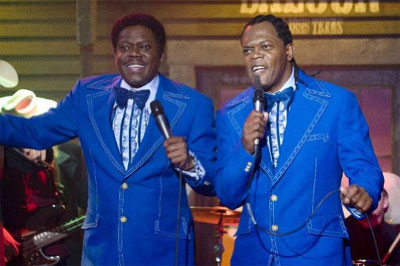 QUESTION: Was it the musical aspect of this that also appealed to you?
QUESTION: Was it the musical aspect of this that also appealed to you?SAMUEL L. JACKSON: Yeah. I love the music, and I love the performance aspect of it.
QUESTION: What did you do, if anything, to research this?
SAMUEL L. JACKSON: No research at all. We kind of know who these guys are. And we've been a close part of the development of the script. So we pretty much told the writers what we wanted in it, and how we wanted them to write it and put the stuff in there, and what the elements were. So we were very comfortable with that.
QUESTION: You've also spent a lot of time in all of your work dealing with your physicality. How was this process, particularly with the hair and all of that, different to a lot of other things that you've done?
SAMUEL L. JACKSON: Not really different at all. Only because we had to go through so many generations. You know, almost like four years of looks. Talking to Robert and Alan, my makeup artists, about who Louis was when he was a younger guy. You know, what he looked like in that time. And then the transitions from one place to another, and their success, and then them being alone, as a singular, two-man group. And then when he goes into jail. What he looks like when he goes into jail, and why he goes into jail. So you have all those elements. So when he comes out, he has that kind of hard prison look. Gained some weight. In another kind of way, prison way, because the diet's not that great. Maybe he did some working out in there, but he did a lot more reading than he'd ever done in his life, when he was in jail, so he's a bit more intellectual now. Which kind of shocks Louis. Louis is not - Louis doesn't know who that guy is. But he can go back to being that [SNAP] other guy pretty immediately. That volatile kind of character that he always was.
QUESTION: When you look at the shots of the earlier you, and those generations, what went through your mind as you were seeing that?
SAMUEL L. JACKSON: Well, you look at the level of success the group had. Try to figure out the group dynamic between the guys. Who was who, what was the hierarchy in the group. Who did what. You know, Marcus naturally was like, the good-looking leader guy who was out front, that all the chicks dug. Kind of brought them in. Louis, sort of that volatile member of the group. Best dancer. But, you know, something went wrong. He physically took care of it, or acted out in another kind of way. And Floyd was always the guy who talked a lot. He was full of bluster and noise, and always thought he should have been the leader of the group. But he wasn't. He kind of ran Marcus off, more than anything else.
QUESTION: Could you identify with the character?
SAMUEL L. JACKSON: Yeah, sure. Sort of a loner. You know, I don't identify with his volatility. But the fact that he reads a lot, has a very definite opinion about the world - a philosophy. That he has a wry sense of humor, and a sort of intense anger that's I guess part and parcel of how he feels like the world has dealt with it.
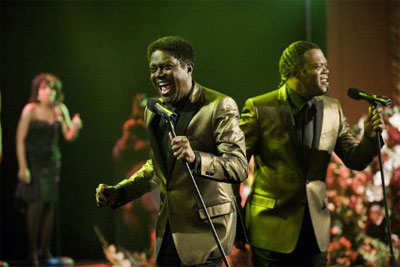 QUESTION: What makes you angry these days, if anything at all?
QUESTION: What makes you angry these days, if anything at all?SAMUEL L. JACKSON: John McCain.
QUESTION: Well, that's a given, right?
SAMUEL L. JACKSON: I'm so amazed - you know, I've been such a nonpolitical animal for so long, that all of a sudden I'm paying attention now, and I'm reading stuff, and I'm watching more news shows and paying attention to this campaign. Just the level of dishonesty and back-biting that goes on is disturbing to me. It's crazy. It's like, how do you let people get away with these lies? Now, and as much as people say - you know, Barack runs as negative a campaign as McCain -
QUESTION: It's a very different kind of negative.
SAMUEL L. JACKSON: A very different kind of negativity. And I want him to respond to it in a different way, but I know he can't, because there's this whole fear of the angry black man that people don't want to see, and the advisors tell him that. But when you're in a direct debate with somebody and they say - somebody asks you about the negativity of these campaigns, and all of a sudden John McCain tries to portray himself as the victim - I really wanted Barack to say, "Yeah. Well, I can't refute what John said, because the things that come out at those rallies between you and Palin that people are shouting are the kinds of things that got Kennedy, Kennedy, and King killed." And it's just a second to say that. And I don't see that that type of angry thing or bad thing, that's just the truth.
QUESTION: Have you met Barack Obama?
SAMUEL L. JACKSON: Yes.
QUESTION: And what are your impressions?
SAMUEL L. JACKSON: Great guy, who is a politician, like all politicians. I think he's - you know, idealistic, sort of to a fault. But, you know, being President is like being a movie star. You can prepare to do a lot of stuff. We prepare as young actors to be movie stars, we hope. But when you get the job, you gotta learn it while you're doing it. There's no way to tell people what this entails. How fame impacts your life, how getting scripts and not going to auditions impacts your life. When you're President, you learn stuff on the job, that you never know what the job - you don't know what the job is 'til you get it. You know, dealing with these other countries, and having to be responsible for the laws and enforcement of those laws. Talking to people, making Supreme Court decisions. Talking to your cabinet every day about what's going on - reading what's going on. Who's coming in. It's a job that's way bigger than anything that they thought it was gonna be. Even John McCain doesn't know the job, when he says, "I got more experience." You have no experience being President. And - Sarah Palin. There's no way in hell she could ever do that job. Just - come on. That's crazy.
QUESTION: Are you optimistic about the results?
SAMUEL L. JACKSON: Yeah. I'm optimistic, but I'm not - you know.
QUESTION: Cocky.
SAMUEL L. JACKSON: No. I'm not so naïve that I know that I could wake up the next day and he would have lost.
QUESTION: You talked about that you would never - you started as an actor in the hopes that you will reach a point that you can become successful as a movie star.
SAMUEL L. JACKSON: Uh-huh (AFFIRM). Of course.
QUESTION: When that happened to you, how did you react to it initially, and how have those perceptions changed now?
SAMUEL L. JACKSON: I perceived it as a different kind of responsibility all of a sudden. Because when I was going to auditions, and trying to get a particular job, I wasn't necessarily responsible for how that project turned out. Because the audition popped - I got the job and got in that movie. Did it. Now, I read a script, I read a story, and I get to make the choice about whether I want to do it or not. And it's a different set of responsibilities to say that, "Well, it's just a job. I just auditioned for it, and I got a job." No. You chose to do this particular story. Why did you choose to do this story, do that character in it? So the responsibility's changed in a very real kind of way. Because I'm the element that gets that movie done, in a very specific kind of way now. Whereas before, there were other people who were the stars, and I was just somebody trying to be a part of that. All of a sudden people tell you, "Well, if you do the movie, we can get it done. So you're responsible for that movie even being made," in a very real kind of way.
QUESTION: You must be one of the hardest working actors around. You seem to work all the time. And I'm wondering how much of that is driven by a need to keep on going. And in the knowledge that maybe one day it'll stop.
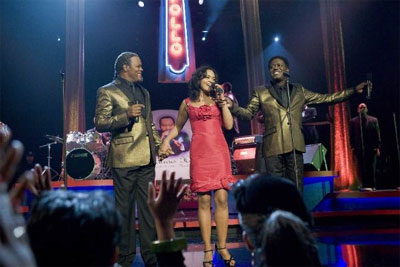 SAMUEL L. JACKSON: Well, there's very much the knowledge that one day it'll stop. All actors have that perception of - you know, once I finish this job, I'll never work again. But I have a need to create. When I was in the theatre, I worked all the time. That's what I did. You know, you audition, you rehearse, and you do plays. And that's what you do. Acting, for me, is like any other creative art form, you know? Like painting. Paintings get up and paint every day. They don't paint one picture a year and stop. I don't understand those actors that do one movie a year. I don't get that. You know? It's like, "Don't you have a need to do another character, or act some more in the year?" I do.
SAMUEL L. JACKSON: Well, there's very much the knowledge that one day it'll stop. All actors have that perception of - you know, once I finish this job, I'll never work again. But I have a need to create. When I was in the theatre, I worked all the time. That's what I did. You know, you audition, you rehearse, and you do plays. And that's what you do. Acting, for me, is like any other creative art form, you know? Like painting. Paintings get up and paint every day. They don't paint one picture a year and stop. I don't understand those actors that do one movie a year. I don't get that. You know? It's like, "Don't you have a need to do another character, or act some more in the year?" I do.QUESTION: Yet you seem to have a strong personal life. You seem to be able to separate your personal and professional lives. How easy is it for you to juggle your responsibilities to your family, and to your art?
SAMUEL L. JACKSON: Pretty easy. My daughter's not home any more. She's grown, she's out of the house. And my wife is an actress, so she's constantly looking for things to do, and kind of moving in and out of this house and the house in New York and visiting my daughter, and - you know, working in various television shows. Or she was supposed to be doing a play. Actually, right now, she was supposed to be on Broadway. But the show didn't happen yet. It's gonna happen maybe in January.
QUESTION: Which play is that?
SAMUEL L. JACKSON: Guess Who's Coming to Dinner.
QUESTION: Really?
SAMUEL L. JACKSON: Yeah. [LAUGHTER] Yeah. Yeah. So she may be doing that again now in January. So, it's easy for me to do. Plus I have, like, other deals. I have a production company thing. I have this deal with New Line. I'm gonna try to find films to do and produce.
QUESTION: New Line - that's through Warner Brothers now?
SAMUEL L. JACKSON: Yeah, now, yeah. And I also have a CBS Television development deal, where I'm developing television shows, to be put on television. So I have that responsibility, where I'm listening to pitches, or giving pitches to television execs, trying to get television shows put on. So I'm pretty much, you know, hands on. Trying to find things to do that when the phone does stop ringing, I'll still be part of the creative process.
QUESTION: You worked on The Spirit, and I know that this process is obviously a lot more - it's a very different kind of process to what you're used to. Well, apart from Star Wars, obviously. You're used to it from Star Wars. Is it creatively more or less satisfying, doing something like that?
SAMUEL L. JACKSON: It's as satisfying as anything else. I mean, the other actors are there. So as long as I'm interacting with some other people, and I'm creating something, I'm fine.
QUESTION: You play the mother of all villains in this movie.
SAMUEL L. JACKSON: Supposedly.
QUESTION: But we've never seen you play a really sort of comic book type villainous character. Was it fun to do that?
SAMUEL L. JACKSON: An enormous amount of fun. I mean, especially since The Octopus in the comics strip and comic books was just a pair of gloves. So I have an opportunity to put flesh and blood to something that no one's ever seen before. They've only seen his voice, in cartoon balloons. So I had an opportunity to just take free run at whatever I wanted it to be, and have as much fun as I wanted. And Frank was very generous in having me do that.
QUESTION: How would you describe Frank as a filmmaker?
SAMUEL L. JACKSON: Kind of ego-less, which is kind of unusual, for a director. He was open to suggestion, and willing to let us try things, or suggest things that he actually said, "Sure. Go ahead, try it." Because he wanted to learn. And he actually trusted the fact that some of us had actually done enough film work that we kind of knew what we were doing. Or he would ask the DP.
QUESTION: You about to work with Gregor Jordan. Can you talk a little bit about what that is, and who you play in that?
SAMUEL L. JACKSON: The film I'm doing with him? I'm doing a film called Unthinkable. And it's about a guy that's planting three nuclear devices in three different cities in the US. And they're trying to find those devices. And the interrogator that they bring in, the questioning that will do -
QUESTION: What else did you finish wrapping recently?
SAMUEL L. JACKSON: Nothing, actually. I haven't done anything -
QUESTION: I don't believe that.
SAMUEL L. JACKSON: I haven't done anything since Soul Men, really. I had the whole summer off. Well, mainly partly because they thought there was gonna be a strike. And nobody was willing to start anything new, the studios anyway. And the independents were - their money was falling out left and right, you know?
QUESTION: Do you think that strike will happen?
SAMUEL L. JACKSON: No, I don't think the strike's gonna happen now. I think the hit that the banks are taking right now is enough to keep everybody kind of in check.
QUESTION: Would you like to return to the theater? I mean, that's where you had your start.
SAMUEL L. JACKSON: I think about it from time to time. Then I'll go watch a play and go, "Oh, wow. It moves from beginning to end that same night!" [LAUGHTER] And, you know, if I'm crazy enough to watch an August Wilson play, I go, "Wow, that's two hours and 30 minutes! Whoa! I used to do that? Wow." I think about it from time to time. And I've had offers to do plays. In fact, I just read two plays. I just didn't like `em.
QUESTION: Is there a classic role that you'd like to play?
SAMUEL L. JACKSON: No. No. In fact, somebody just asked me if I wanted to do Othello.
QUESTION: I was thinking the exact same thing.
SAMUEL L. JACKSON: Nah?
QUESTION: Really? Huh. You'd be a good Othello.
SAMUEL L. JACKSON: I've done it. I don't like the play that much.
QUESTION: Really?
SAMUEL L. JACKSON: Yeah. It kind of bothers me that a guy that old's kind of that naïve. [LAUGHTER] The guy's been all over the world kicking ass, and looting and plundering and raping and pillaging, and falls in love with a 12-year-old and then kind of gets jacked. Something's wrong with that.
QUESTION: [LAUGHTER] Hopefully you'll be at Barack's inauguration.
SAMUEL L. JACKSON: I'm looking forward to that.
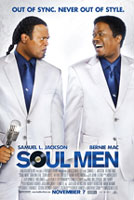
Soul Men
Starring: Samuel L. Jackson, Bernie Mac, Sharon Leal, Sean Hayes, Affion Crockett, Adam Herschman, John Legend, Jennifer CoolidgeDirector: Malcolm D. Lee
Genre: Comedies
Two former backup soul singers Louis (Samuel L. Jackson) and Floyd (Bernie Mac) travel cross country to perform at a tribute concert in honor of their famous former band leader. They haven't spoken to each other in 20 years but reluctantly... Two former backup soul singers Louis (Samuel L. Jackson) and Floyd (Bernie Mac) travel cross country to perform at a tribute concert in honor of their famous former band leader. They haven't spoken to each other in 20 years but reluctantly agree to travel together for the tribute performance. Both Jackson and Mac will do their own musical and dance performing in the film.
MORE
- Mission: Impossible Fallout
- Glenn Close The Wife
- Allison Chhorn Stanley's Mouth Interview
- Benicio Del Toro Sicario: Day of the Soldado
- Dame Judi Dench Tea With The Dames
- Sandra Bullock Ocean's 8
- Chris Pratt Jurassic World: Fallen Kingdom
- Claudia Sangiorgi Dalimore and Michelle Grace...
- Rachel McAdams Disobedience Interview
- Sebastián Lelio and Alessandro Nivola...
- Perri Cummings Trench Interview
Copyright © 2001 - Female.com.au, a Trillion.com Company - All rights reserved. 6-8 East Concourse, Beaumaris, Vic 3193, Australia.



